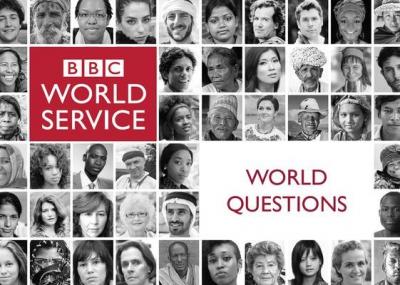BBC World Questions comes to Italy 'at a critical time'

ROME -- The BBC World Service came to the Eternal City to record a BBC World Questions debate to be aired Saturday, chaired by Jonathan Dimbleby at a critical time in Italy, allowing the public to question their politicians face to face.
The programme, as part of a series of English-language debates staged in partnership with the British Council in capitals across the world during “a time of change,” was recorded at the Italian capital’s Centro Congressi Piazza di Spagna Wednesday, providing an opportunity to discuss the future of the Bel Paese at this key moment in its history.
Italians recently voted against the Prime Minister’s proposed constitutional reforms. Matteo Renzi said they were needed to provide stable government to a leading European country which has had 63 governments since the end of the Second World War. Following Renzi’s resignation, Paolo Gentiloni has been appointed as Italy's seventh Prime Minister in 10 years.
However, it is not only political stability that threatens Italy. The country’s banking crisis and economic conditions have the potential to impact the lives of all Italians and could even destroy the Euro. Early elections are possible and with the Euro-sceptic Five Star Movement riding high in the polls, a referendum on Italy’s place in Europe could be just around the corner.
The panel was made up of Sandro Gozi, undersecretary to the prime minister with responsibility for European Affairs; Deborah Bergamini, member of the Chamber of Deputies and spokesperson for Forza Italia; Nathalie Tocci, chief advisor to Federica Mogherini, High Representative of the European Union for Foreign Affairs, and Manlio di Stefano of the Five Star Movement, who is a member of the Italian Chamber of Deputies.
These politicians and specialists were quizzed by the audience on Italy’s pressing challenges, with questions such as, “Why did Italians vote ‘no’ in the referendum?” “How would you address the problem of unemployment of the young and of the lower middle classes?” “Is there a constitutional solution to overcome corruption?” and “If you had to launch a campaign on migration, what would be the main message you would try to get across?” The responses were varied, analytical, hugely insightful, and often rather conflicting.
Paul Sellers, Director of the British Council in Italy, said: “We are delighted to be partnering with the BBC in bringing World Questions to Rome. This programme generates space for open and independent debates on current affairs, which supports the British Council’s objective of promoting cultural relations among people worldwide. We believe that connecting people both in Italy and globally makes a powerful and lasting contribution to a more open and connected world.”
‘BBC World Questions: Italy’ will be available on www.bbc.com/worldserviceradio from Saturday Jan. 14, 2017 8:00 - 9:00 p.m. GMT.
nkd


